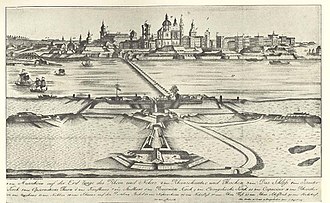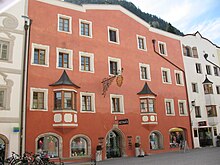Wilhelm von Metzen
Wilhelm von Metzen , full name Wilhelm Franz Joseph von Metzen (born April 29, 1766 in Koblenz-Ehrenbreitstein , † December 15, 1809 in Rattenberg , Tyrol ) was an officer and regimental commander of the Bavarian Army who was highly decorated for bravery and who ended tragically with suicide .
Life
origin
The family had lived in Wittlich since the 17th century . Wilhelm von Metzen was born as the son of Lieutenant Colonel Elector and Oberfeldkriegsommissar Johann Wilhelm Emmerich von Metzen. Before that, the father worked as an envoy for the Electorate of Trier in Paris. As such, he and his descendants were raised to the hereditary nobility in Vienna on August 23, 1780, under the title Edler von Metzen .
Award in the French War
Metzen served as an officer in the 1st Kurpfalz-Bavarian Feldjäger Regiment Schwichelt . Here he commanded the 6th Company as a captain in 1798 . When the peace agreement of Campo Formio (1797) was signed, the German areas on the left bank of the Rhine were ceded to France. An additional agreement (Loeben Treaty and Heidelberg Convention), however, left the Mannheimer Rheinschanze located on the left bank of the Rhine (today's Ludwigshafen am Rhein ) on German territory. While the Rastatt congress was still negotiating the details of the peace treaty, France a. a. also secure the Rheinschanze on the left bank of the Rhine near Mannheim and the commanding General Charles Nicolas Oudinot requested the fortress to be surrendered on January 25, 1798. The Mannheim commandant Adam von Bartels then relocated four companies of the 1st Electoral Palatinate-Bavarian Feldjäger Regiment, under Lieutenant Colonel Theodor von Karg, from Mannheim to the advanced position of the Rheinschanze.
There was a protracted battle in which the French also began to bombard Mannheim. Therefore Bartels sent his representative, Lieutenant Colonel Johann Andreas von Traitteur , to the left bank of the Rhine to have the Rheinschanze handed over. The caterer intervened in the ongoing fight and sounded the trumpet. Lieutenant Colonel von Karg went to the fortress for handover negotiations. During the negotiations, the French suddenly stormed into the open fortress with a surprise attack, where they had now penetrated from the side. The majority of the crew under Lieutenant Colonel Karg (approx. 400 people) had to surrender, only Captain Wilhelm von Metzen was able to save himself with about 50 men in a scuffle through the French and reach the ship's bridge towards Mannheim. Pursued by the French troops, Metzen managed to cross the Rhine while fighting with his soldiers , to get to the Mannheim Rheintor and to order the gatekeeper to close the drawbridge, which prevented the enemy from penetrating the Mannheim fortress .
The contemporary historical-political narratives of the latest state and world events report in 1798 in the following words:
“ After several attempts the French finally succeeded in penetrating the Rheinschanze on the left flank and at the same time a bunch of them came, you don't know whether on ships or other routes, the hill in the back and mastered the Rhine bridge. Now the crew was cut off from retreat; but one part managed to get through, and even to get over the bridge to the right bank of the Rhine with a cannon and an ammunition cart. The French followed and would perhaps have penetrated the town with the retreating crew if, as it is commonly said, the prudence and courageous demeanor of Captain von Metzen had not done the same. "
The weakly occupied Mannheim could not offer the French any greater resistance, which is why negotiations between Bartels and Oudinot came about, in the course of which Mannheim remained unmolested, but the Mannheim Rheinschanze fell permanently to France. For his resolute action in the unfortunate battle, Wilhelm von Metzen was promoted to major and received the Kurpfalz-Bavarian Military Medal of Honor , the highest honor in his country. At the foundation of the Military Max Joseph Order (which replaced the previous military decoration) Wilhelm von Metzen was accepted as a commander.
After the battle at the Mannheim Rheinschanze, Metzen became the owner of the 1st Kurpfalz-Bavarian Feldjäger Regiment, which then bore his name; from 1801 it was called 1st Light Infantry Battalion Metzen.
Death in the Tyrolean campaign
On May 2nd, 1807 Wilhelm von Metzen was promoted to command of the 5th Bavarian Line Infantry Regiment von Preysing . As an ally of France, he took part in the Bavarian campaign in Tyrol in 1809 , first as a lieutenant colonel , and finally as a colonel . He fought with his regiment u. a. in August 1809, in the 3rd Bergisel battle and after its unfortunate outcome with the French had to retreat through the Lower Inn Valley. After the Treaty of Schönbrunn , the French and Bavarians returned to Tyrol as an occupying power in October 1809; Wilhelm von Metzen was there again from October 25, 1809. Criticism of the bravery of his troops and his personal abilities by the French commander-in-chief François-Joseph Lefebvre and General Jean-Baptiste Drouet d'Erlon led to the tragic end of Metz . Deeply hurt in his honor, he shot himself in the head in Rattenberg, at the “Zum Goldenen Adler” inn (where Andreas Hofer had held an important council of war on June 1, 1809) on December 15, 1809 at 1 o'clock in the afternoon . On the 17th of the month, Colonel Wilhelm von Metzen was buried there with military honors. His skull with the ball hole in the forehead and the inscription “Kgl. bayer. Colonel v. Metzen ” was later, as a relic from the French era, on the so-called Mount of Olives in front of the sacristy of the parish church in Rattenberg . Upon request, tourists were shown the room where the officer shot himself. According to the communication of the cath. Parish Rattenberg (August 31, 2012) was an ossuary under the Mount of Olives in front of the sacristy ; the bones stored here - presumably including the Colonel von Metzens, including skulls - were removed there in 1978 and buried in the local cemetery.
Metzen's contemporary witness and comrade, Sergeant Joseph Schrafel, wrote in his memoirs:
“ But all of our hearts were saddened by an event which touched us all the more as it came quite unexpectedly. Our good colonel, Baron von Metzen, put an end to his life in Rattenberg with a pistol shot. We could never really find out what could have moved this man of honor to take such a step. It is not for me to write down the rumors that were circulating about this. We soldiers, who loved him like a father, mourned him for a long time, and we will never forget him. "
literature
- The Bavarian Soldier in the Field , Volume 1, Pages 62-66, Bavarian War Archives , Munich 1898
- Emil Nesseler: The Rheinschanze as an electoral Palatinate fortress , Westmark Verlag Ludwigshafen am Rhein, 1940, pages 101-106
- Rudolf Granichstaedten-Czerva: Andreas Hofer's old guard , Innsbruck 1932, pages 341-344
- Joseph Schrafel: Strange fate of the former sergeant Joseph Schrafel in the royal Bavarian fifth line infantry regiment , Nuremberg, 1835; Complete scan with several passages on Wilhelm von Metzen (death on page 39)
Web links
Individual evidence
- ↑ Des Hohen Erz-Stifts and Churfürstenthums Trier Hof-, Staats- und Stand-Kalender , Trier 1787; Scan to the father
- ^ Genealogisches Handbuch des Adels, Volume 121, Page 201, 2000, ISBN 3798008213 ; Excerpt from the source
- ↑ Scan from the source
- ↑ Königlich-Baierisches Wochenblatt of Munich , Volume 8, 1807, column 118; Scan from the source
- ↑ Captain Kießling: History of the Royal Bavarian 5th Infantry Regiment, Berlin, Mittler & Sohn, 1898, page 200
- ↑ Königlich-Baierisches Regierungsblatt , Munich, year 1810, column 187; Scan from the source
- ↑ Rudolf Granichstaedten-Czerva: Andreas Hofer's old guard , Innsbruck 1932, pages 341-344
- ↑ Website with Schrafel's remarks on the death of Metzen
| personal data | |
|---|---|
| SURNAME | Metzen, Wilhelm von |
| ALTERNATIVE NAMES | Metzen, Wilhelm Franz Joseph von |
| BRIEF DESCRIPTION | Bavarian Colonel, Commander of the Max Joseph Order |
| DATE OF BIRTH | April 29, 1766 |
| PLACE OF BIRTH | Koblenz-Ehrenbreitstein |
| DATE OF DEATH | December 15, 1809 |
| Place of death | Rattenberg (Tyrol) |


